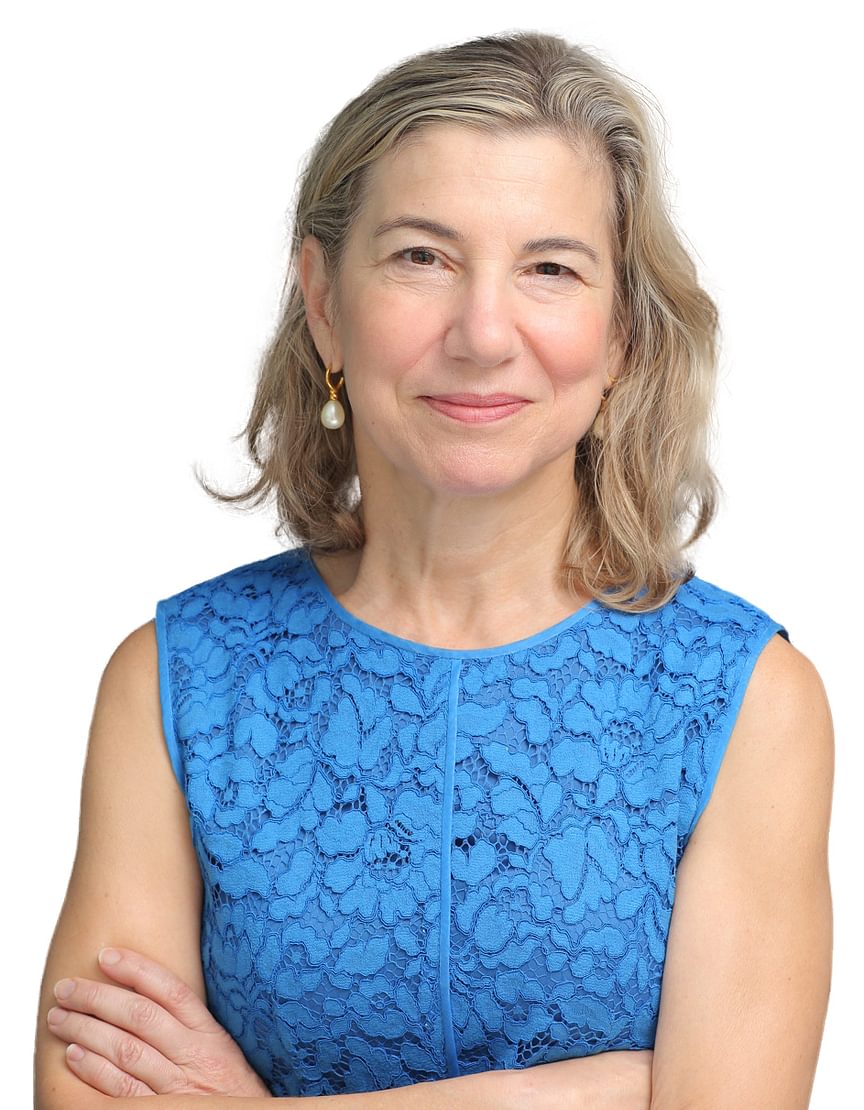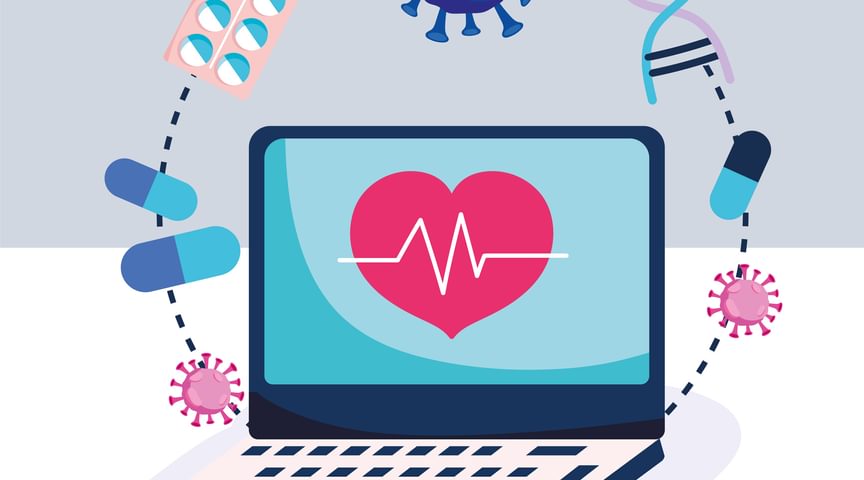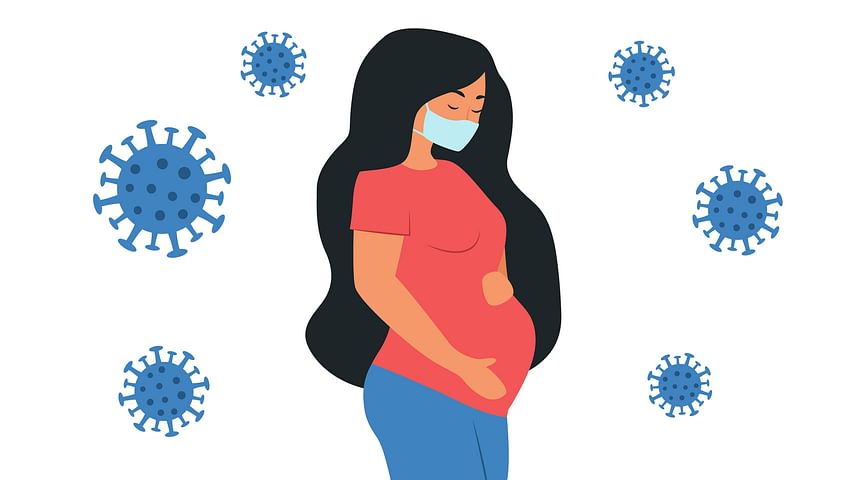
May 08, 2020
Preserving the joy of childbirth during COVID-19
The world may be in a pandemic, but women are still having babies. Dr. Catherine Monk ’81 is easing their stress.by Rita Savard
Catherine Monk walks into the hospital room, unrecognizable in a tight-fitting mask and gloves. The expectant mother can only see her eyes.
Monk’s current daily uniform is different from her normal attire. But times are anything but normal.
“What is amazing is just how much is communicated through the eyes,” Monk says. “You’re smiling, I’m smiling. I’m giving you conscious awareness through the expressiveness of my eyes. We pick up on these cues in milliseconds. And a warm touch—even from a gloved hand—can still be very supportive.”
The director of Women’s Mental Health @ Ob/Gyn for NewYork-Presbyterian/Columbia University Irving Medical Center, Monk is well known for her groundbreaking research in perinatal neurodevelopment and care. But ever since COVID-19 hit New York City hard in March, Monk and her team, along with others redeployed, have been in the trenches supporting mothers (neonatal and postpartum) in labor and delivery.
COVID-free spaces don’t exist anymore. But what we’ve learned a lot about in recent weeks, is how to make an environment COVID safe.
”On average, more than 10,000 babies are born every day in the United States, according to the Centers for Disease Control and Prevention. That won’t change as the new coronavirus continues its march across the country. What is changing, explains Monk, is access to maternal care—with telemedicine quickly shaping the future of public health.
“Childbirth will inevitably feel different for many women,” Monk says. “The support network of family and friends that they might usually have surrounding them can’t be there physically right now. So we’re finding other ways to bring in that support. Even if it’s virtual, knowing and feeling like you have a support system has a positive impact on a mother’s mental health.”
Delivering a child is stressful in the best of times. A global health crisis adds to the anxiety. By focusing on providingmental health care through a perinatal support team—available to mothers before, during, and after birth—Monk is working to make sure that having a baby during a pandemic will still be a joyful experience.

SWAPPING IN-PERSON VISITS FOR VIRTUAL CARE
In the first weeks of the epidemic, two women—who were asymptomatic at the time they were admitted to New York-Presbyterian hospital—ended up developing symptoms of COVID-19 during and after delivery. The likelihood that health-care workers and others in the hospital were exposed was very concerning, and the hospital immediately implemented a policy to stop the potential spread of the virus.
“That experience made it clear that we had to test all women who presented at labor and delivery,” Monk says. “Once we instituted universal screenings, we found instances of women having the virus to be more widespread. But the policy changes helped us to better handle what was coming, and to protect women and newborns.”
While expectant mothers had more measures in place to protect their health and well-being, the new rules allowed them only one visitor during delivery. After the baby was born, they were on their own.
“COVID-free spaces don’t exist anymore,” Monk says. “But what we’ve learned a lot about in recent weeks is how to make an environment COVID safe.”
Having to self-isolate meant coming up with creative solutions to provide mothers with much-needed support while keeping their environment COVID safe. This is when a team—made up of medical and health experts, friends, and family—is deployed through telemedicine. And it’s having a positive impact.
A woman who had just given birth at the hospital, whose only language is Spanish, found herself alone after delivery, without a family member present to translate. She was struggling with breastfeeding. The hospital brought in its lactation consultant, who used her cell phone to access a communication center. From there, the women were connected to an interpreter who translated, step by step, the lactation consultant’s instructions.
“The mother, who was visibly frustrated prior, was smiling,” Monk says. “She was so thankful to have ‘people’ there guiding her through. Every baby is different, whether it’s your first or fourth. Having a support system in place is everything.”
Mothers are now being virtually connected with their families in the hospital, and midwives, doulas, obstetricians, and psychologists are reimagining how they work. Everything from breastfeeding video consults to free group support classes is helping new mothers with the dual isolation of the postpartum period and quarantine.

While telemedicine offers a bright spot by providing access to health support, Monk worries about the risks involved for marginalized individuals who might not have access to online care.
“Immigrant and lower socioeconomic populations already account for a disproportionate amount of maternal and neonatal morbidity and mortality,” Monk says. “Without the luxury of being able to work from home, and having to self-isolate within crowded multifamily apartments or homes, they represent a disproportionate amount of COVID-19 cases. Risk is not equally shared.”
To help as best as they can, Columbia University’s public health students are calling every mother postpartum to see what their needs are and triage priorities. In addition to expanding free access to virtual support groups, and providing guidance through websites, email lists, and YouTube, partnerships with other organizations can help fill gaps and address pressing needs.
“The system is not perfect,” Monk says. “But what this crisis is exposing is the need to create a central set of resources on prenatal and postpartum care. That could lead to better experiences for mothers and babies.”
Dr. Catherine Monk is professor of medical psychology in the Departments of Obstetrics & Gynecology and Psychiatry at Columbia University Irving Medical Center and Research Scientist VI at the New York State Psychiatric Institute. She is also founding director of the newly launched initiative to embed women’s mental health in Columbia’s ob/gyn department—Women’s Mental Health @ Ob/Gyn—in which she and other mental health professionals help women manage stress, depression, and anxiety across the lifespan. To learn more about her research lab, Perinatal Pathways, visit www.perinatalpathways.org.





